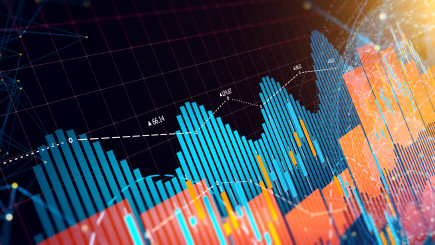Online data analytics courses
Properly analyzing data is the key to turning raw information into actionable intelligence. Learn more about data analysis, taking data analytics courses online, and career options for graduates.

What is data analytics?
Data analysis is the process of extracting information from data. It involves multiple stages, including establishing a data set, preparing the data for processing, applying models, identifying key findings, and creating reports.
The goal of data analysis is to find actionable insights that can inform decision-making. Often, this involves data mining, descriptive and predictive analysis, statistical analysis, business analytics, and big data analytics.
Data analysis is a versatile skill that can be utilized in many industries, including finance, healthcare, media, retail, government, manufacturing, and education.
Featured Data Analysis Courses
Browse online Data Analysis Certificates
Find new interests and advance your career opportunities
Stand out in your field
Use the knowledge and skills you have gained to drive impact at work and grow your career.
Learn at your own pace
On your computer, tablet or phone, online courses make learning flexible to fit your busy life.
Earn a valuable credential
Showcase your key skills and valuable knowledge.
Certificates
Related Topics
Data analysis course curriculum
Data analytics classes will vary based on the goals set by the provider, industry focus, and other factors. However, students can expect to learn foundational information such as:
- The full data analysis process, from data collection to sharing key findings.
- Types of data structures, file formats, and data sources.
- Tools for gathering, wrangling, mining, and analyzing data.
- Data visualization for sharing data analysis findings with stakeholders.
Aspiring data analysts may also need to learn how to use specific data analysis tools. Consider starting with the following key tools:
- Microsoft Excel: spreadsheet software that allows you to collect, clean, organize, and analyze data sets
- Python: a programming language commonly used for data analysis
- R: a programming language that can be used for data mining
- Structured Query Language (SQL): a programming language used for managing relational databases, which can be used to analyze information within those databases
Courses in data analytics can serve two main purposes: providing a strong introduction to the field or helping you learn specific aspects of data analysis in a concentrated format.
For example, big data analytics classes help with interpreting large, diverse data sets while bioinformatics courses focus on analyzing biological data for scientific purposes, such as for medical research. Online data analytics courses are also useful for students wanting to become a software developer or similar role.
What careers can you have in the data analytics field?
The Bureau of Labor Statistics (BLS) projects high levels of growth in the data analysis field. For example, the BLS projects 36% growth for data scientist positions from 2023–33. Additionally, market research analyst and financial analyst positions are projected to grow by 8% and 9%, respectively, over the same period.
How to become a data analyst
There are multiple paths to becoming a data analyst. The required level of education may depend on the specific data analyst job and industry. Some positions may require a bachelor's degree or a master's degree in data science or a related field, while others may require a boot camp education in data analytics. Keep in mind that many master's programs offer online options, reducing costs and inconveniences associated with in-person education.
Many mid-career professionals who want to switch to data analysis can pursue executive education programs in data analytics. These programs don't typically confer a degree and take anywhere from a few weeks to a few months to complete.
Anyone can learn data analysis, but certain traits can be helpful for roles in this field. Individuals who enjoy mathematics, computer science, statistics, and the research process may be a good fit for a data analysis career. To learn more about this subject, individuals can start with an introductory online data analysis course to see if it is a career path they'd like to pursue.
Learn data analytics online with edX
Are you ready to delve deeper into the complex world of data analysis? Sign up for an online course in data analytics through edX today.
More opportunities for you to learn
We've added 500+ learning opportunities to create one of the world's most comprehensive free-to-degree online learning platforms.
FAQ about online data analytics courses
Last updated June 4, 2025